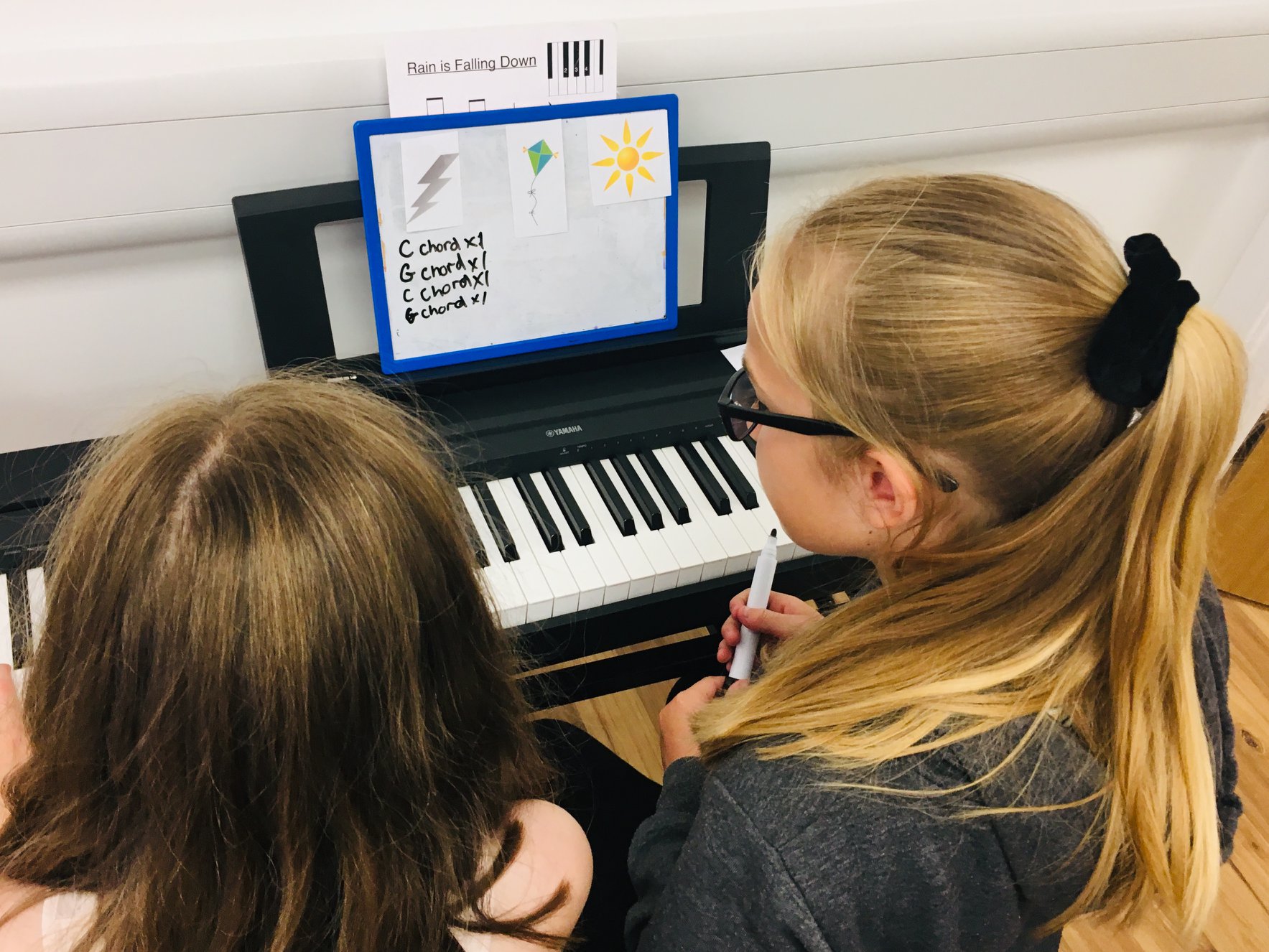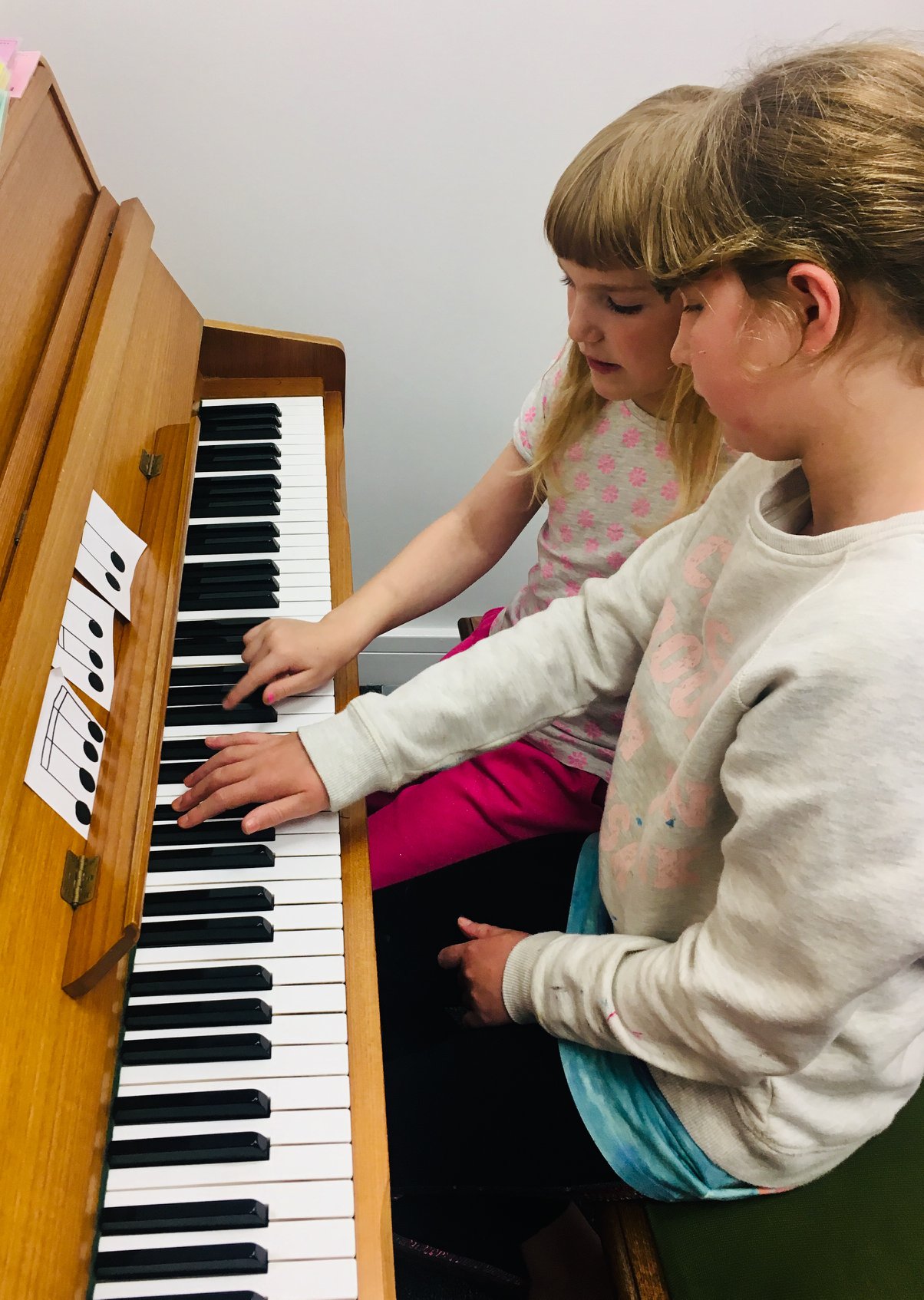Today’s guest post has been written by Jeni Warder who is the founder and creative director of the Keys Piano School in Bolton (UK). Jeni is writing a series of posts for this blog focusing on using composition as a helpful learning tool for younger students. Over the Jeni…

Composing our own, original music is always a liberating experience, allowing us to express ourselves and embrace our musical vulnerability. As a child and student, I was always fascinated by its possibilities; the opportunity to explore big and expressive ideas, or work my own thoughts and feelings into my work. Now, as a teacher and founder of Keys Piano School, I am even more excited by the potential of using composition as a teaching tool. The fact I have found it so rewarding as a musician helps to inspire them further.
“My own composing does influence my teaching, as I tend to use the same principles with my students at first. It gives them something to focus on – a musical ‘voice’ from which they can gradually develop their own”.
Melanie Spanswick, composer, teacher and writer.
As a school we use the Trinity exam syllabus, largely because of the way it embraces student compositions as a valid substitute for a third set piece. Out of the seventy-one graded exams we entered over the past academic year, almost half of them chose to perform their own compositions. Through this I feel Trinity sends a very clear message to students: Your own music is valid, and you should perform it with the same pride as any other work.
How we teach it, where to start and what to expect, will soon be the subject of a new series of blog posts, so in this article I want to share simply why, at Keys, we have made composing a core element of our curriculum for all students.
It’s about them
I adore teaching those children who bubble over with enthusiasm at the beginning of every lesson, excitedly telling me about their wobbly tooth or the new puppy! Taking time to get to know about their lives and interests really strengthens the critical relationship between student and teacher, and therefore has a hugely positive impact on the success of the partnership. Teaching through composition provides a perfect opportunity for children to bring all these important areas of their life experience with them into their lessons. We can take the time to find out about their favourite pop songs, musical styles they enjoy, about their favourite story, poem, character or pet – it’s all relevant and can feed into the story we create at the piano.
It encourages freedom to experiment
It’s great to be able to read and write the language, but you have to be able to SPEAK the language too!”
Cyrilla Rowsell of the British Kodály Academy, on the use of improvisation in music lessons.
Generally speaking, all new pieces must start life as improvisation. Developing this skill through its frequent inclusion in lessons, whether or not a composition happens to arise from it, results in musicians who are confident in their ability to create music at any given opportunity, without the need to have anything prepared. Improvisation is particularly motivating for those who have been struggling with reading notation in pieces, and in all students encourages listening and awareness of important elements such as dynamics and phrasing. When given a simple set of parameters within which to work, learners can feel particularly liberated to be in a situation where there are no wrong notes. Those who have not yet learnt the rules are still free to explore, while those with more experience can enjoy not being bound by them. On many occasions, improvisation has taken an unintended twist which becomes a main feature of the piece! Our recent Keys album “The Seasons Reinvented” actually begins with such a note, (Rachel Hosie’s ‘January, Prelude to Midwinter’) with an unexpected and piercing G sharp over an A minor chord which we felt conveyed the iciness of January particularly well!

It invites questioning
At every level, composition throws up questions about what works, what doesn’t, and, most importantly, why. Learners can develop understanding of structure, chords, inversions, cadences and modulation in context, without the need for tutor books which often seem unrelated to their own musical journey. The desire to create something which sounds full, exciting and dramatic means most students are open to exploring theory more fully than in other situations. Of course, the ability to understand these concepts is an essential skill for all pianists as they advance to bigger, more complex repertoire.
It develops understanding of notation
I’m open-minded when it comes to how a composition should be notated, and much of this is decided by the level of the student. For our Foundation students (beginner-initial level), a graphic score, using pictures to represent each section, is the most practical way for them to record their ideas. As students progress, this process can be covered in more depth. I find the most beneficial way to use the notating phase is to pick out certain elements to consolidate a students’ understanding. For example, that might be simply writing the rhythm on a whiteboard, or notating the main theme may be all that is required. Large, hands-on equipment such as the Manumat stave from Blackrock Music (see image below), is a great way to start for younger children. I passionately believe, however, that no aspiring musician should be prevented from composing in a way they enjoy due to the inability to, as yet, notate it fully.

It creates a sense of self as a musician
At Keys we always share new pieces with an audience in some way, whether in person or online, which inevitably generates positive feedback. This in itself can be very motivating, and it’s not only their confidence which benefits from a composition project. Students’ attitude towards learning new pieces becomes more inquisitive and insightful, as they have a deeper understanding of the humanity behind each work, bringing the great musicians of the past into clearer focus. More importantly, by adding to the great history of music in their own small way, they start to see their place in the story.
As a school we naturally want to offer our children a comprehensive education in the rich history of classical music, but it’s crucial we also make music which reflects our own time, place and experience. This way we can raise a generation of young musicians with questions and opinions, who see their music as a part of themselves, and understand that over time they can develop their own style, and their own voice.

Jeni Warder (pictured above) is a composer and the founder and Creative Director of Keys Piano School in Bolton, Greater Manchester. Keys is a Champion Centre for Trinity College examination board, and also released an album of student/teacher collaboration works entitled “The Seasons Reinvented” in 2021.
My publications:
For much more information about how to practice piano repertoire, take a look at my piano course, Play it again: PIANO (published by Schott Music). Covering a huge array of styles and genres, the course features a large collection of progressive, graded piano repertoire from approximately Grade 1 to advanced diploma level, with copious practice tips for every piece. A convenient and beneficial course for students of any age, with or without a teacher, and it can also be used alongside piano examination syllabuses too.
You can find out more about my other piano publications and compositions here.
from Melanie Spanswick https://melaniespanswick.com/2022/02/07/finding-their-voice-progress-through-composing-by-jeni-warder/
No comments:
Post a Comment